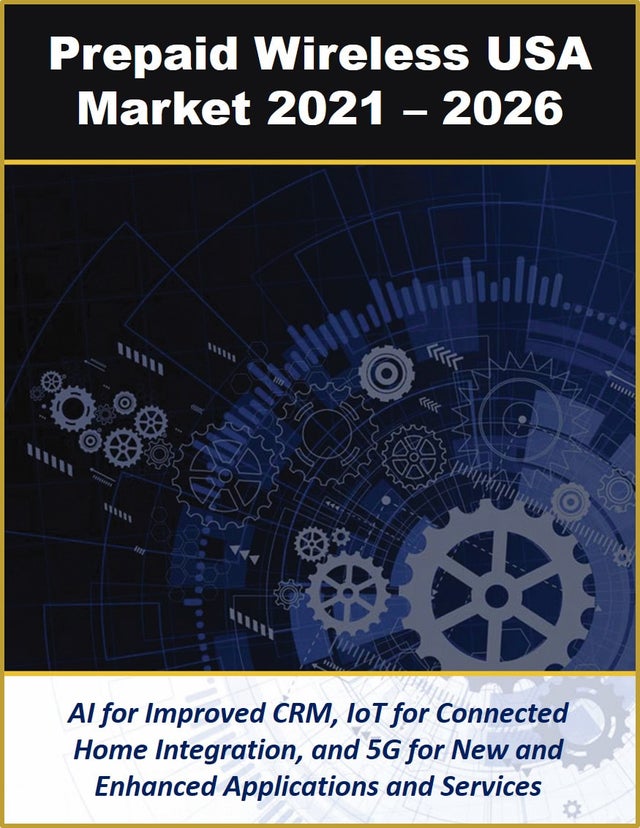United States Prepaid Wireless Market by Technology, Applications and Services 2021 – 2026
This report evaluates the prepaid wireless market in the United States including major provider analysis and service assessment, technologies involved in prepaid service delivery, and assessment of the future of prepaid communications, content, and commerce. The report includes analysis of the 5G impact.
The report also provides forecasts for 2021 through 2026. The report also analyzes major MVNO companies and offerings. The report also provides a view into the future of prepaid wireless and market forecasts through 2026 including subscribers and Revenue by Voice vs. Data vs. VAS and by Connectivity Type.
Prepaid wireless service providers in the United States have become increasingly competitive in recent years as they evolve offerings to be more on par with post-paid service features and plans. For example, Verizon Wireless now offers prepaid family plans, unlimited plans, and support for BYOD whereas this was not the case just a few years ago. We anticipate the continued evolution of prepaid wireless in general as part of a dominant trend towards prepaying mobile services becoming increasingly more comparable with post-paid wireless.
Published: February 2021
Pages: 137
Global Enterprise License: $ 5,000 USD
Overview:
This report evaluates the prepaid wireless market in the United States including major provider analysis and service assessment, technologies involved in prepaid service delivery, and assessment of the future of prepaid communications, content, and commerce. The report includes analysis of the 5G impact.
The report also provides forecasts for 2021 through 2026. The report also analyzes major MVNO companies and offerings. The report also provides a view into the future of prepaid wireless and market forecasts through 2026 including subscribers and Revenue by Voice vs. Data vs. VAS and by Connectivity Type.
Prepaid wireless service providers in the United States have become increasingly competitive in recent years as they evolve offerings to be more on par with post-paid service features and plans. For example, Verizon Wireless now offers prepaid family plans, unlimited plans, and support for BYOD whereas this was not the case just a few years ago. We anticipate the continued evolution of prepaid wireless in general as part of a dominant trend towards prepaying mobile services becoming increasingly more comparable with post-paid wireless.
The future of prepaid wireless communications will depend on more than just carrier-centric applications, communications, content, and commerce. For example, Mind Commerce sees prepaid as an important aspect of many next-generation services that are provided by a variety of third-party service companies that do not wish to offer a postpaid option as it would typically rely upon wireless carrier billing via prepay.
Growth in prepaid wireless service will also depend on the extent to which next-generation services such as virtual reality are generally supported on a pre-pay basis. This is to say that prepaid customers must have access to wireless data plans that put them on par with postpaid in terms of both bandwidth and low-latency required for acceptable end-user quality of experience.
While many emerging applications will be offered by Over-the-Top (OTT) service providers, we strongly recommend that MNOs offer their own branded/controlled Value-added Service (VAS) applications. The OTT application business model has caused data payload (e.g. apps that use data) to become increasingly more valuable to consumers than data itself, which is rapidly becoming a marginalized commodity. With this development, VAS applications become much more important to network operators.
With the ever-increasing commoditization of carrier core services (mostly voice and messaging), there will be a growing dependence on VAS applications for initially top-line revenue growth (as data growth tapers off and margins are squeezed) and then for margin growth as bearer services become a cost-plus commodity. Prepaid wireless service providers must also provide their own VAS apps to remain competitive, even if it necessitates them offering those apps on an OTT basis themselves.
Target Audience:
· MVNO companies
· OTT application providers
· ICT infrastructure providers
· Mobile application developers
· Communication service providers
· Investors in wireless communications
· Brands, advertisers, and marketing agencies
Companies in Report:
· Airvoice Wireless
· AT&T
· Best Cellular
· Black Wireless
· Boom! Mobile
· Boost Mobile
· Cell NUVO
· Cellular Abroad
· Consumer Cellular
· CREDO Mobile
· Cricket Wireless
· DataPass
· Dataxoom
· easyGO (Locus)
· EcoMobile
· Freedompop
· Gen Mobile
· Google FI
· GoSmart Mobile
· GreatCall
· H2O Wireless (Locus)
· Hayai Mobile
· Ideal Mobile
· Jolt Mobile
· Kajeet
· Karma Mobility
· KidsConnect
· Liberty Wireless
· Lycamobile
· Metro by T-Mobile
· Mint Mobile
· NET10
· Page Plus Cellular
· Payless Cellular
· PixWireless
· PureTalk
· Red Pocket Mobile
· Republic Wireless
· Simple Mobile
· Straight Talk
· T-Mobile
· Tello
· TextNow
· Ting Mobile
· Tracfone Wireless
· Twigby
· Ultra Mobile
· Unreal Mobile
· US Cellular
· Verizon
· Virgin Mobile USA
· Walmart Family Mobile
· Zing Wireless
· ZIP SIM
Table of Contents:
1 Executive Summary
2 Introduction
3 United States Communication Service Providers
3.1 Wireless Carrier Offerings
3.1.1 Prepaid and Postpaid Wireless Market Overview
3.1.2 Prepaid Technology Approaches
3.1.3 Prepaid and Postpaid Market Strategy
3.1.4 Prepaid Wireless Technology
3.1.5 Prepaid Market Outlook
3.2 USA Prepaid Wireless Market Handset Providers
3.3 Drivers for Growth in Wireless Prepaid Services
3.3.1 Credit Challenged
3.3.2 Unbanked Users
3.3.2.1 High costs
3.3.2.2 Convenience
3.3.2.3 Funding Needs
3.3.2.4 Lack of knowledge
3.3.2.5 Identification Requirements
3.3.2.6 Bad Banking History
3.3.2.7 Overall Perceptions of Banking
3.3.3 Temporary and Infrequent Users
3.3.3.1 Anonymity Market
3.3.3.2 Cost Control Market
3.4 Other Factors and Outlook
3.4.1.1 The OTT Effect
3.4.1.2 The Unlimited Data Effect
3.4.1.3 The 5G Effect
3.4.1.3.1 5G Market Focus and Network Readiness
3.4.1.3.2 Consumer 5G Applications and Services
3.4.1.3.3 Enterprise and Industrial 5G Apps: Prepay or MVNO Play?
4 United States Prepaid Wireless Service Provider Analysis
4.1 AT&T
4.1.1 Plans
4.1.2 Feature Analysis
4.1.3 SWOT Analysis
4.1.4 AT&T MVNO Companies
4.2 T-Mobile
4.2.1 Overview
4.2.2 Feature Analysis
4.2.3 SWOT Analysis
4.2.4 T-Mobile MVNO Companies
4.3 US Cellular
4.3.1 Overview
4.3.2 Plans
4.3.3 Feature Analysis
4.3.4 SWOT Analysis
4.4 Verizon
4.4.1 Overview
4.4.2 Plans
4.4.3 Feature Analysis
4.4.4 SWOT Analysis
4.4.5 Verizon MVNO Companies
4.5 Comparative Analysis of Wireless Prepaid Plans
4.6 Prepaid Wireless Industry Consolidation
5 Sprint and T-Mobile Merger Impact on Prepaid Wireless
5.1.1 Impact on United States Carrier Ecosystem as a Whole
5.1.2 Impact on Mobile Virtual Network Operators
5.1.3 Impact on Prepaid Subsidiaries: Boost, Metro PCS, and Virgin Mobile
6 Mobile Virtual Network Operators
6.1 Overview
6.2 MVNOs Leverage MNO Assets
6.3 MVNOs Leverage MVNE Infrastructure and Services
6.4 MVNO Strategies
6.5 MVNO Differentiation
6.6 Prepaid vs. Postpaid Offerings
6.7 Plan Overview and Analysis
6.8 Select MVNO Case Study Analysis
6.8.1 Airlink Mobile (DS Mobile)
6.8.2 Airvoice Wireless
6.8.3 JOLT Mobile
6.8.4 Boost Mobile
6.8.5 Consumer Cellular
6.8.6 GreatCall
6.8.7 kajeet
6.8.8 Liberty Wireless
6.8.9 H2O Wireless (Locus Telecommunications)
6.8.10 Virgin Mobile USA
6.8.11 Cricket (AT&T)
6.8.12 Wal-Mart
6.8.13 Page Plus
7 USA Prepaid Wireless Forecasts 2021 – 2026
7.1 Wireless Prepaid Subscriber Forecast by Connectivity Type 2021 – 2026
7.2 Prepaid Wireless Revenue Forecast by Type, and Connectivity 2021 – 2026
7.3 Monthly ARPU Forecast 2021 – 2026
7.4 Prepaid Wireless Service Provider Market Share 2021 – 2026
8 Future of Prepaid Wireless: Value-added Services
8.1 Real-time Communications: RCS and WebRTC
8.2 Prepaid and Stored Value in Mobile Commerce
8.3 BYOD and Prepaid
8.4 Prepaid and Payments
8.5 Prepaid and Wearables
8.6 Prepaid and the Smart Workplace
8.7 Prepaid and Virtual Reality
8.8 Prepaid and Public Safety
8.9 Prepaid and Internet of Things
8.10 Offer Strategies for Value Added Services
8.10.1 Subscription
8.10.2 Per-use Services
8.10.3 Data
8.10.4 Messaging
8.10.5 On-demand Service
8.10.6 Up-selling from On-demand to Subscription
9 COVID-19 Impact on Prepaid Wireless in the United States
9.1 Could Covid-19 lift the prepaid market in the United States?
9.2 Initiatives and Steps taken by Key Players
9.2.1 Verizon
9.2.2 T-Mobile and Sprint
9.2.3 AT&T
9.3 Headwinds for the US Prepaid Wireless Market
10 Conclusions and Recommendations
11 Appendix: MVNO Strategies
11.1 MVNO Types
11.1.1 Full MVNO
11.1.1.1 Advantages
11.1.1.2 Disadvantages
11.1.1.3 Operational Model / MVNO Architecture
11.1.1.4 MVNO Business Model (FULL MVNO)
11.1.2 Service Provider
11.1.2.1 Advantages
11.1.2.2 Disadvantages
11.1.2.3 Operational Model / MVNO Architecture
11.1.2.4 MVNO Business Model
11.1.3 ESP: Enhanced Service Provider (Hybrid MVNO)
11.1.3.1 Advantages
11.1.3.2 Disadvantages
11.1.3.3 Operational Model / MVNO Architecture
11.1.3.4 MVNO Business Model
11.1.4 Branded Reseller
11.1.4.1 Advantages
11.1.4.2 Disadvantages
11.1.4.3 Operational Model / MVNO Architecture
11.1.4.4 MVNO Business Model
11.2 MVNO Models
11.2.1 Discount MVNOs
11.2.2 Lifestyle/niche MVNOs
11.2.3 Media/Entertainment MVNOs
11.2.4 Ethnic MVNOs
11.2.5 Business MVNOs
11.2.6 Brand MVNOs
11.2.7 Data MVNOs
11.2.8 M2M/Telemetry MVNOs
11.2.9 Quad Play MVNOs
11.2.10 Roaming MVNOs
11.3 Additional Case Study Analysis of USA MVNO Companies
11.3.1 CellNUVO
11.3.2 Cellular Abroad
11.3.3 AirVoice Wireless
11.3.4 Airlink Mobile
11.3.5 Jasper Wireless (Cisco)
11.3.6 ZingPCs
11.3.7 Boost Mobile
11.3.8 Disney Mobile
11.3.9 ZIP SIM
11.3.10 Bratz Mobile
11.3.11 Consumer Cellular
11.3.12 CREDO Mobile
11.3.13 DBS Communications
11.3.14 Defense Mobile
11.3.15 Freedom-Wireless
11.3.16 GreatCall
11.3.17 Kajeet
11.3.18 KORE Wireless
11.3.19 Liberty Wireless
11.3.20 MetroPCS
11.3.21 Lycamobile
11.3.22 PixWireless
11.3.23 National Geographic
11.3.24 NET10
11.3.25 Nextel Partners
11.3.26 Page Plus
11.3.27 Payless Cellular
11.3.28 PlatinumTel Communications
11.3.29 Google Fi
11.3.30 Red Pocket Mobile
11.3.31 Ting
11.3.32 Total Call Mobile
11.3.33 Tracfone Wireless
11.3.34 Virgin Mobile USA
11.3.35 Cricket Wireless
11.3.36 H2O Wireless
11.3.37 RingPlus
11.3.38 PureTalk
12.0 Appendix: 5G Technology, Infrastructure, and Services
12 5G Technology
12.1 5G and Core Network Infrastructure
12.1.1 5G and Edge Computing
12.1.2 5G and Network Slicing
12.2 5G and Radio Network Infrastructure
12.3 5G Capabilities
12.4 5G and Ultra-high Definition Voice Service
12.5 5G and Non-voice Applications and Services
12.6 5G Impact on Public Safety Services
12.7 5G Impact on the Internet of Things
Figures
Figure 1: Prepaid Phone Options
Figure 2: Roaming in Cellular Networks
Figure 3: AT&T Prepaid Pricing
Figure 4: T-Mobile Prepaid Pricing
Figure 5: Verizon Prepaid Pricing
Figure 6: USA MVNOs
Figure 7: Airvoice Wireless Pricing
Figure 8: Jolt Mobile Pricing
Figure 9: Consumer Cellular Pricing
Figure 10: The 5G Network Slicing Infrastructure and Solution Ecosystem
Figure 11: 5G Network Slicing Support of Different Application Types
Tables
Table 1: Wireless Prepaid Unique Subscribers by Connectivity Network 2021 – 2026
Table 2: Wireless Prepaid Subscribers 2021 – 2026
Table 3: Wireless Prepaid Revenue by Voice vs. Data vs. VAS 2021 – 2026
Table 4: Wireless Prepaid Revenue by Connectivity 2021 – 2026
Table 5: Wireless Prepaid Revenue 2021 – 2026
Table 6: Wireless Prepaid Average Monthly ARPU 2021 – 2026
Table 7: Wireless Prepaid Vendor Market Share by Subscription 2021 – 2026

